
http://www.kindamuzik.net
ernaast
Onze laatste liverecensie.
Onze laatste albumrecensie.
Ons laatste interview.
Onze laatste video.
Boards of Canada | Geogaddi
A repetition of style from the Warp Boards.
CD, Warp
Tekst: Omar Muñoz-Cremers
Publicatiedatum: 23 februari 2002

The thing is, these 'most anticipated albums' somehow never live up to expectations. Even if you willingly try to keep your hopes to an appropriate level, they initially end up as a disappointment. In this class, there are of course albums that eventually become classics once the game of hype dies down. 'Geogaddi' the much-anticipated follow-up to 'Music Has A Right To Children' probably will grow out of the shadow of its towering predecessor, but at the moment it feels both predictable and unfocussed. The issue of predictability is the curse coming back to haunt innovators, 'Geogaddi' uses the same template as the debut, a collection of long rhythmic tracks in combination with sublime miniatures. This is now officially the way Boards of Canada present their music, it's a good way and why change a winning formula? Again expectations: the misguided idea that the second album could replicate the exciting feeling of discovery of 'Music Has A Right To Children'. There's no way around it , 'Geogaddi' is a consolidation not a leap forward. Which at least narrows the focus when discussing the album and hopefully rids the music of superfluous meanings of progression, revolution and radicalism. Boards of Canada have fought that battle and now opt for tweaking their successful model.
The opening of the album sets these ideas, 'Ready Let's Go' being a typical Boards of Canada miniature, sad, beautiful and melancholic. 'Music Is Math' the first long track again feels familiar thanks to the return of that unique round bass sound. 'Gyroscope' is a hypnotic track that sounds like 'Ummagumma' era Pink Floyd with intricate drum programming. While the group manage to keep things a bit minimal here, the track also features the first of a number of reverse sounds, the slightly psychedelic cliché they are way too fond of on this album and that indeed would be responsible to the pre-release rumor that 'Geogaddi' was recorded in such a way that one could play the album backwards without any trouble. The problem I have with much of the album is exemplified with the much praised '1969', which makes clear that Boards of Canada have fallen victim to a common trap plaguing electronic artists: filling tracks with too much detail. The insistence of putting layer upon layer takes away the power of the beautiful vocoder lines and consequently almost ruins '1969'.
But this is the new Boards of Canada album so even if one perceives it with an overly critical eye there will be plenty of music to enjoy. All the miniatures are outstanding, they remain the Boards of Canada secret weapon and they do keep me wondering why the group relies on often unspectacular and unnecessary beats. 'Over The Horizon', 'Diving Station' and 'You Could Feel The Sky' are vintage Boards of Canada pearls: simple, enchanting melodies that make you feel nostalgic whether they are played on a piano or as thin synth waves. Two longer tracks should also be singled out: 'The Beach At Redpoint' combines a beautiful melody with wordless female singing to produce something close to an IDM My Bloody Valentine track. The nefarious 'The Devil Is In The Details' lives up to its title (not coincidently the album is exactly 66 minutes and 6 seconds long): sounding not unlike a lost track from 'Selected Ambient Works II' it cleverly creates a spooky atmosphere through the interplay of a woman's voice intoning a text, the sound of a cat in distress and a very strange rustling sound that somehow works as a second rhythm track. The echoes of prime Aphex Twin and on 'You Could Feel The Sky' early Biosphere somehow seem to predate the album to a time before 'Music Has A Right To Children', even at its best the album feels like it should have been released in 1993 or 1994. Actually, a pretty good time for music, no the real problem of 'Geogaddi' is the nagging feeling that something is lacking behind the music. 'Music Has The Right To Children' posed some uncanny questions regarding the status of memories, collective identity and the relation between childhoods in the seventies, music and technology. 'Geogaddi' partly just asks the same questions yet with less conviction. The remaining questions it puts to the listener are still too shadowy and unclear to comprehend. One wonders if they are questions at all.
http://www.kindamuzik.net/recensie/boards-of-canada/geogaddi/1346/
Meer Boards of Canada op KindaMuzik: http://www.kindamuzik.net/artiest/boards-of-canada
Boards of Canada audio en video:
» Audio: Telephasic Workshop (3voor12)» Audio: Orange Romeda (3voor12)
» Audio: Oscar See Through Red Eye (3voor12)
Meer Boards of Canada op KindaMuzik:
» Achtergrond: Het auditieve utopia van Boards of Canada» Bezoek de Boards of Canada artiestpagina








Deel dit artikel: